2024: The Year in Parking Reform
Parking reform has been gaining momentum nationwide with more cities and even states tackling the issue. Donald Shoup’s The High Cost of Free Parking, the gospel of parking reform, keeps spreading in architecture, urban planning, developer and government circles. This year, Detroit City Council Member Angela Whifield Calloway tweeted on X: “Eliminating parking minimums in Detroit is a conversation that is long overdue. Not only will it allow for better use of land but helps provide affordable housing, expansion of transit, and it relieves burden on taxpayers to get things done.”
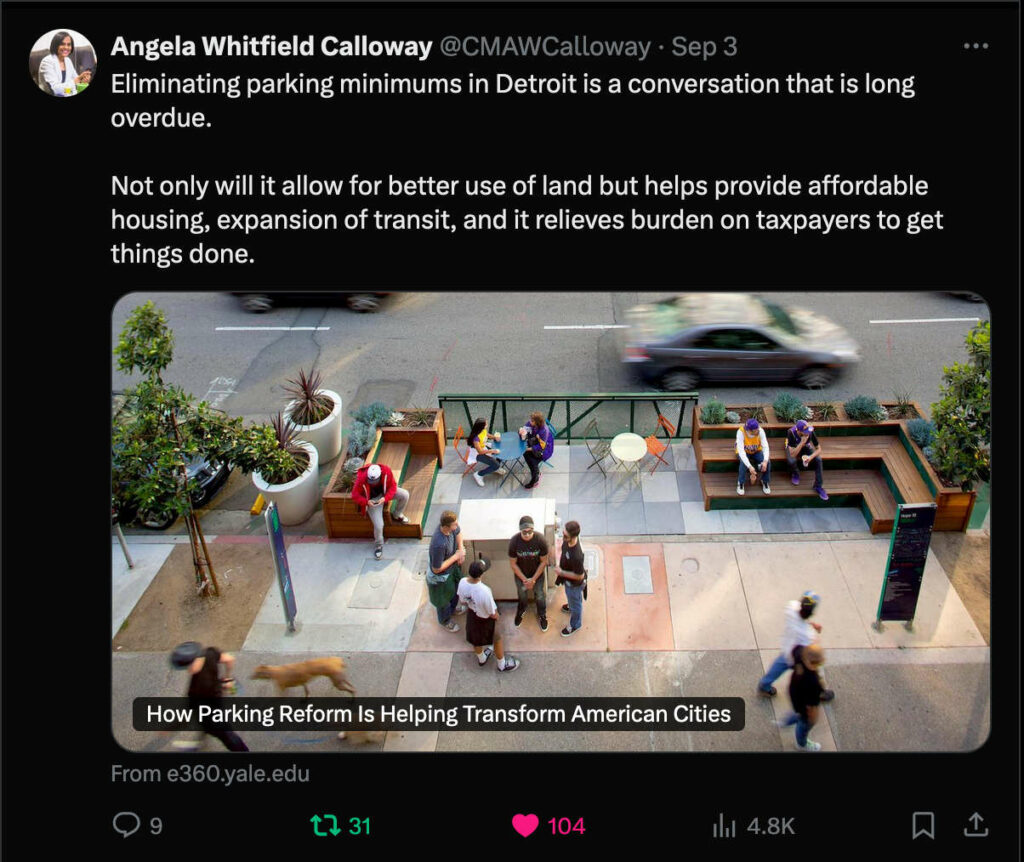
And CityNerd Ray Delahanty now sports a Detroiters for Parking Reform laptop sticker in his videos following his meet and greet with TRU earlier this year. Check out the recap video he published following his visit to Detroit.
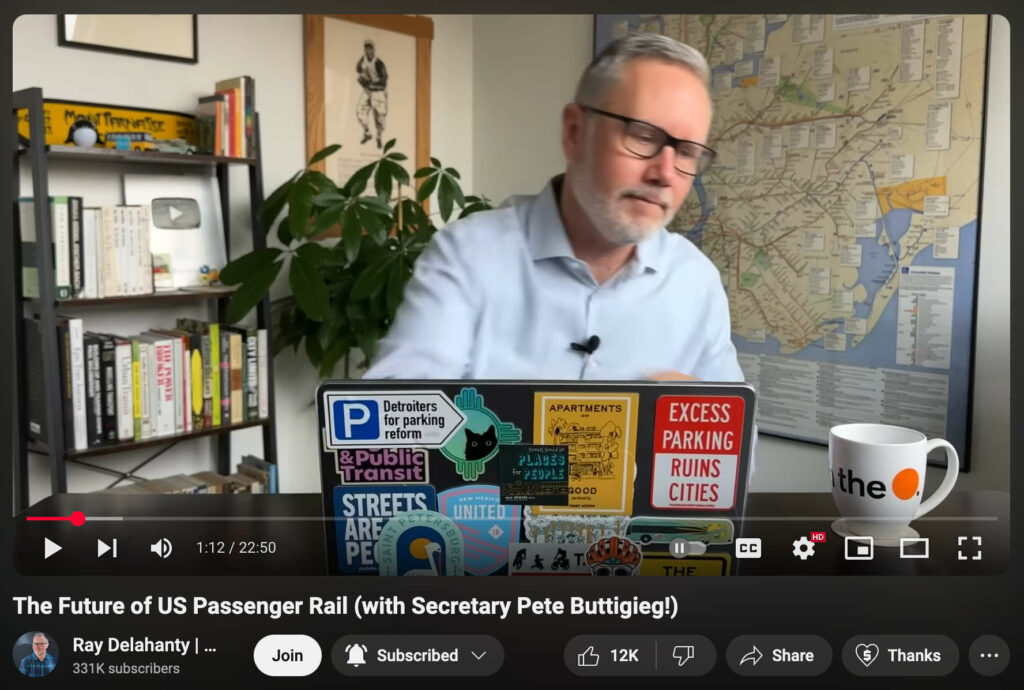
Will 2025 be the year that Detroit joins Austin, Sacramento, Richmond, Buffalo, Minneapolis-St. Paul and other cities in repealing parking mandates citywide? Could a new administration in Lansing put Michigan on the parking reform map in 2026 or 2027?
With all of what’s brewing in parking reform, here are the top five Detroit-centric parking reform news threads of 2024.
#5 – Cass/Henry housing development
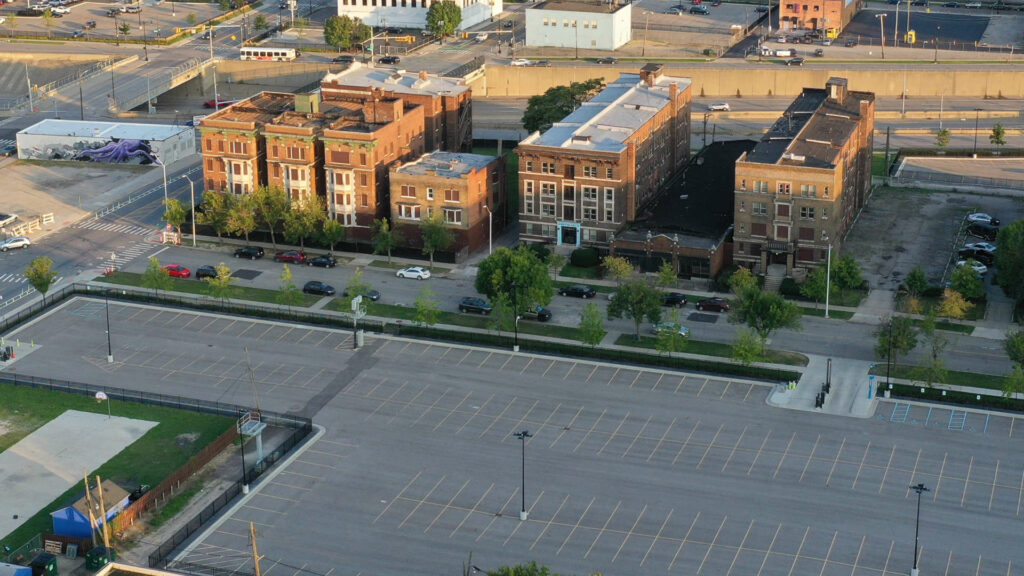
When a big Detroit real estate development press release drops, some longtime development watchers invoke “Skipper’s Rule,” meaning “I’ll believe it when I see it.” There have been many cases of projects announced that, for a variety of reasons, fail to materialize. Challenges around financing, escalating costs, citizen or governmental pushback or other factors can contribute to the long list of vaporware projects. Every so often, a project given up for dead comes back to life. The 19th century apartment buildings at Cass and Henry in the District Detroit are such a case.
The planned 2017 demolition of the Hotel Ansonia and Atlanta Apartments sparked a battle between the building owners and preservationists that resulted in the formation of the Cass/Henry Historic District, which held off demolition. The speculation was that the buildings, directly across Cass Avenue from Little Caesars Arena, would become surface parking lots serving the arena and other venues in the district.
What was looking like certain death for these buildings is shaping up as a historic preservation and affordable housing win for all stakeholders. The buildings, rechristened The Henry Street Apartments, are now surrounded by construction fencing and are being renovated into housing with an affordable set-aside. They are rare examples of a type of walk-up housing that was once common in Detroit but is now functionally extinct. Due to the scarcity of remaining housing stock like it, and the laws of supply and demand, this historic walk-up apartment housing in close proximity to downtown will no doubt be much sought-after. Owners Olympia Development of Michigan have brought in partners Cinnaire to help structure and finance redevelopment projects like this one.
The skeptics among us might hold fast to Skipper’s Rule and delay any celebration until the ribbon is cut. Progress on the Henry Street Apartments gives reason for, at minimum, guarded optimism that the numerous buildings in Olympia Development’s real estate portfolio may gradually see new life as something other than surface parking.
#4 – Detroit CAN do transit well
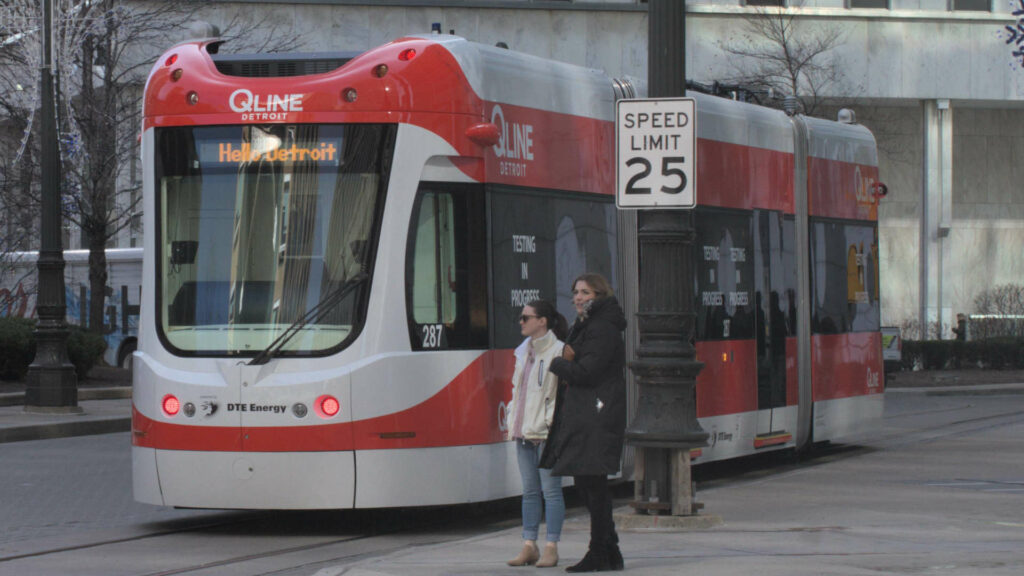
Just as a tree can’t grow without adequate sunlight and water, a city needs a high-functioning transportation system to make parking reform a reality. Parking reform and public transit go hand-in-hand. Detroit’s public transit shortcomings are well-documented and beyond the scope of this short roundup. In 2024 we had a glimmer of hope with the NFL Draft. We saw what can happen when the region’s transit operators and public/private sector leaders work together to solve transportation challenges, even if only for one day. The 2024 NFL Draft was a huge success, with Detroit shattering attendance records and getting overwhelmingly positive reviews as the host city.
According to WXYZ, the Detroit People Mover and QLine each reported nearly 70,000 rides during the Draft. The Detroit Airport Express (DAX) service reportedly had nearly 1,000 rides during the Draft. Temporary express park-and-ride shuttles ran from various locations around the metro area to get fans to and from downtown quickly and efficiently.
Transit investment and rational parking policies are cornerstones of a strong city. The 2024 NFL Draft showed that we can do transit well and that people will come downtown by means other than a personal automobile if they are presented with viable alternatives. This would free up land currently locked up as parking for housing, hotels and other higher-value uses, making our city and region economically stronger and more sustainable.
#3 – Paradise Valley gains a new cultural amenity
Earlier this year, the Music Hall Center for the Performing Arts announced the construction of a new venue on the site of a high-visibility surface parking lot.
The parking lot is at Madison and Randolph, right next door to the Music Hall on a major route to/from I-375/75 and footsteps from Ford Field, Comerica Park, the Detroit Athletic Club, Detroit Opera House and 36th District Court. The lot is being developed by the Music Hall Center for Performing Arts into a new cultural anchor for the Paradise Valley district. The new venue will include a new concert hall, recording studio, music academy, dance studio, all-city box office and welcome center, retail and food service/cafe.
If only the Madison-Lenox Hotel across the street hadn’t been demolished for surface parking in the mid-2000s.
#2 – Renaissance Center
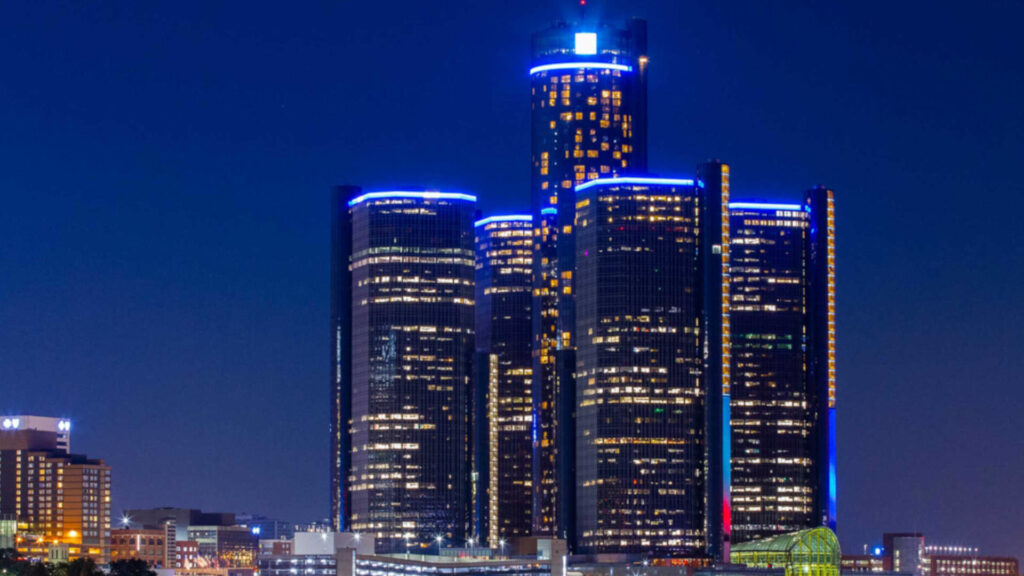
It’s been all over the news and formed the basis of Detroiters for Parking Reform’s 2024 Walking Tour. GM’s departure from the RenCen brings into focus questionable land use decisions on the East Riverfront over the past decades and perhaps affords the opportunity for a reset. The RenCen sprouted on the riverfront in the 1970s. Land to the east gradually became a sea of parking lots and structures during the ensuing decades. The public launch of the RiverWalk happened during the Kilpatrick administration and has evolved to become one of the city’s crown jewels. How can the city double down and turn a dead zone of parking into a neighborhood with housing, jobs, services and amenities accessible to all?
There’s an opportunity undo the damage done by large-scale, top-down mega projects like the RenCen. Hopefully this time the focus will be on smaller, more productive, organic, inclusive, human-scale development accessible to smaller “mom and pop” developers. Detroit and Detroiters haven’t been served well when ultra-wealthy elites play a real-world version of Cities Skylines on the map of downtown Detroit and populate it with large-scale vanity projects. The RenCen was an example of the latter.
#1 – Land Value Tax proposal: Resurget Cineribus?
The Land Value Tax (LVT) is a proposal that would change how property taxes are calculated. Under current law, unimproved property, such as raw land or a surface parking lot, incur minimal property taxes, while improved land, such as an apartment or office building, is assessed at a substantially higher rate. The Land Value Tax would split the tax rate, assessing higher taxes on land parcels and lower taxes on the buildings sitting on top of them. Because of the split tax rate, land value taxes are sometimes referred to as a “split-value tax.” Researchers estimate that a land value tax would reduce property tax rates for the overwhelming majority of Detroit homeowners, reduce the rate of tax foreclosure and keep more Detroiters in their homes. The average homeowner would see an 18.3 percent reduction in their property tax bill. A Land Value Tax was included in our 2019 position paper as one of the measures Detroiters for Parking Reform advocates for.
The Land Value Tax was first floated by Detroit Mayor Mike Duggan at the 2023 Mackinac Policy Conference. It was covered extensively during the latter half of 2023, but lost steam sometime in late 2023/early 2024 as support seemed to peter out. So, although never officially reported as such, 2024 was effectively the year the Detroit Land Value Tax died.
LVT could get another shot with a new legislature in Lansing in the new year. Should Mayor Duggan move up I-96 and into the Governor’s Mansion in Lansing, LVT could rise to the top of the agenda again.
